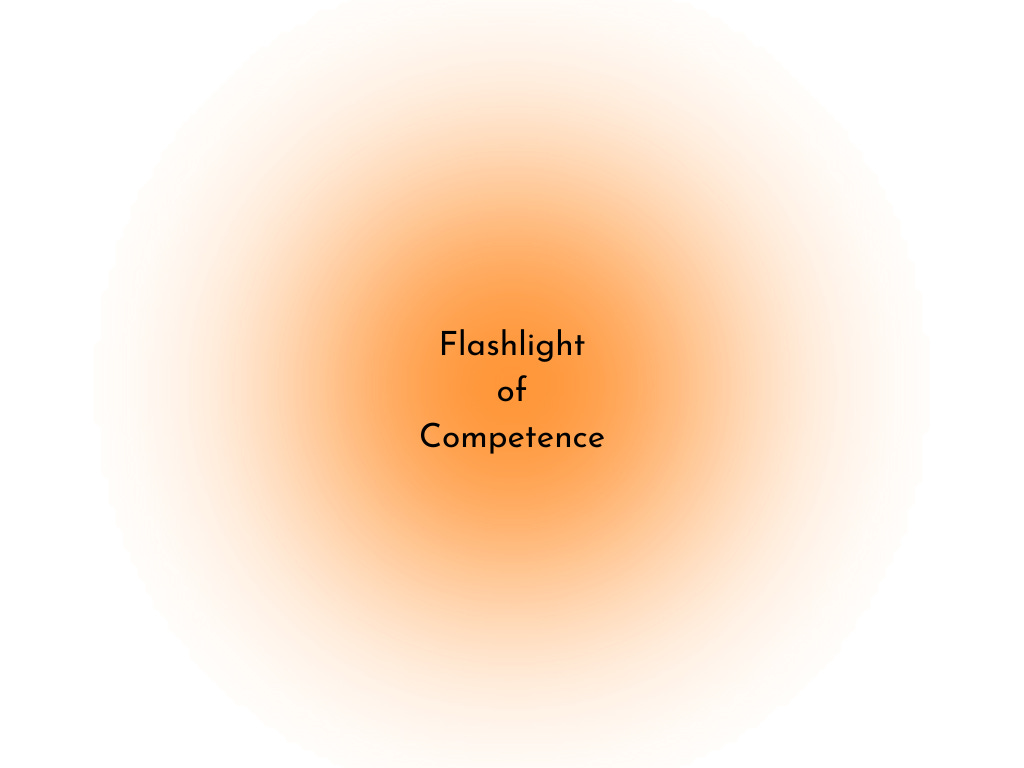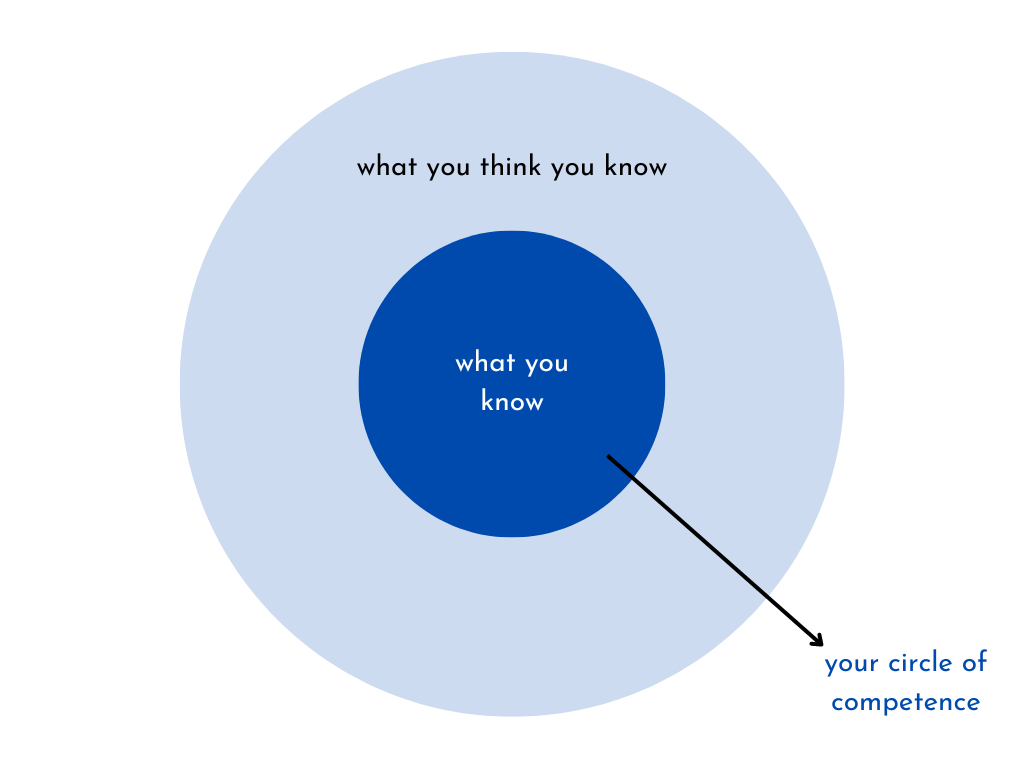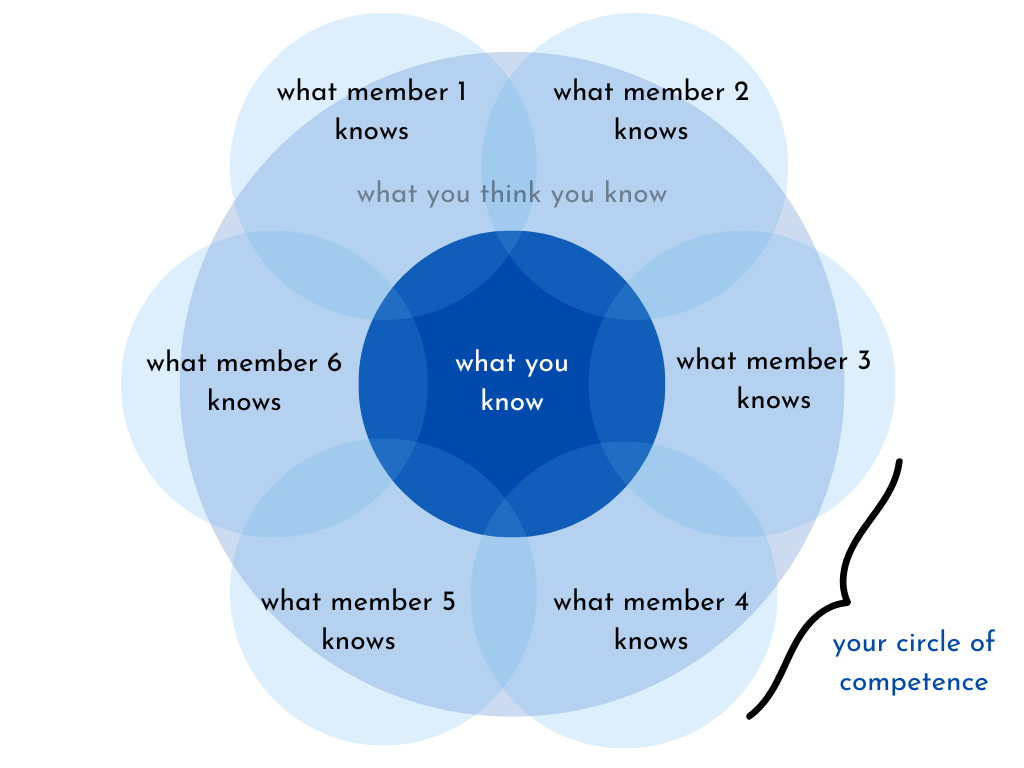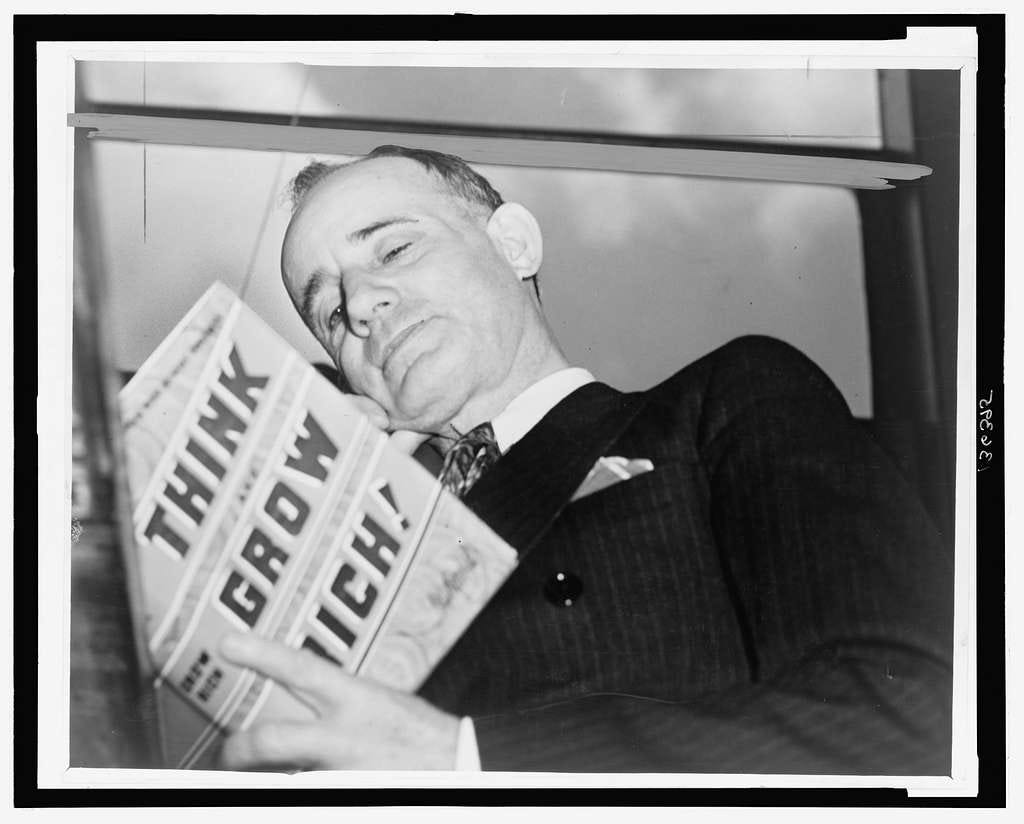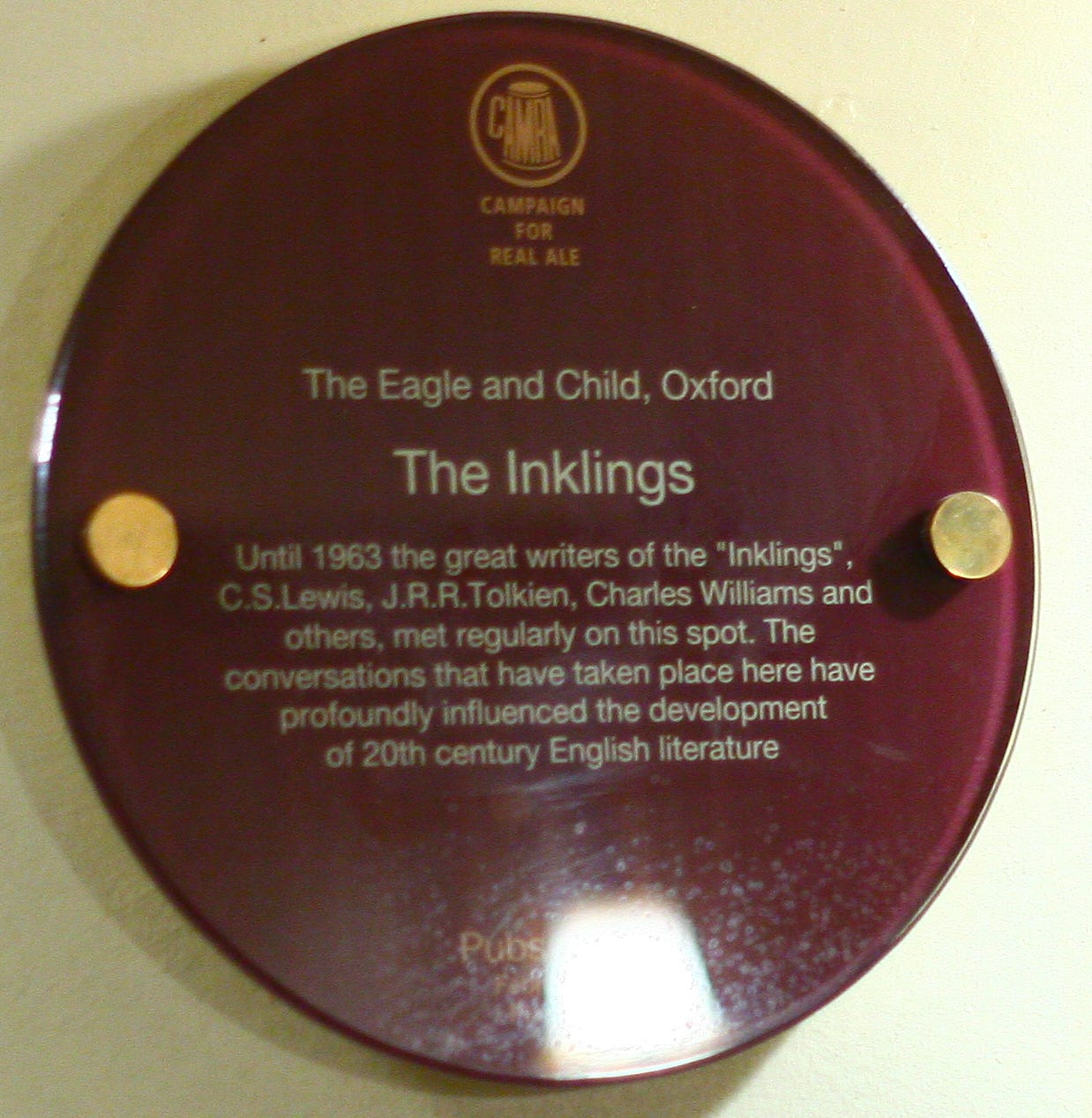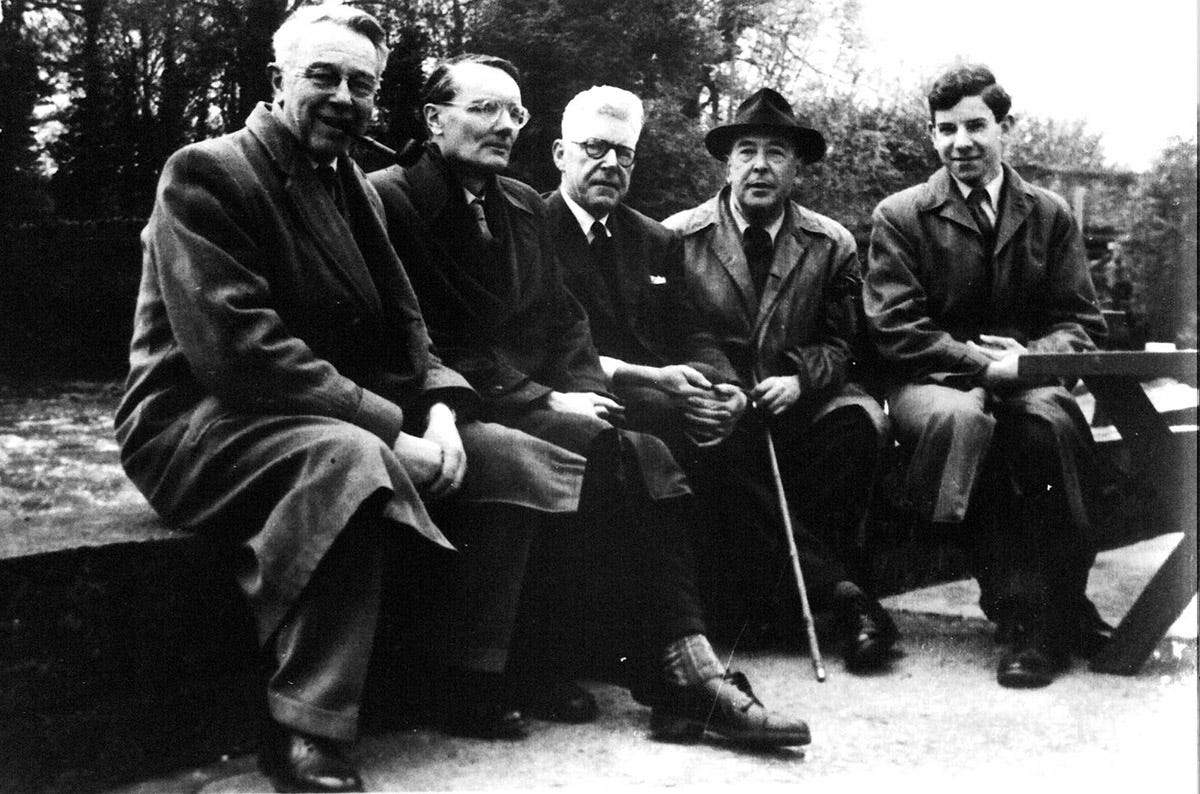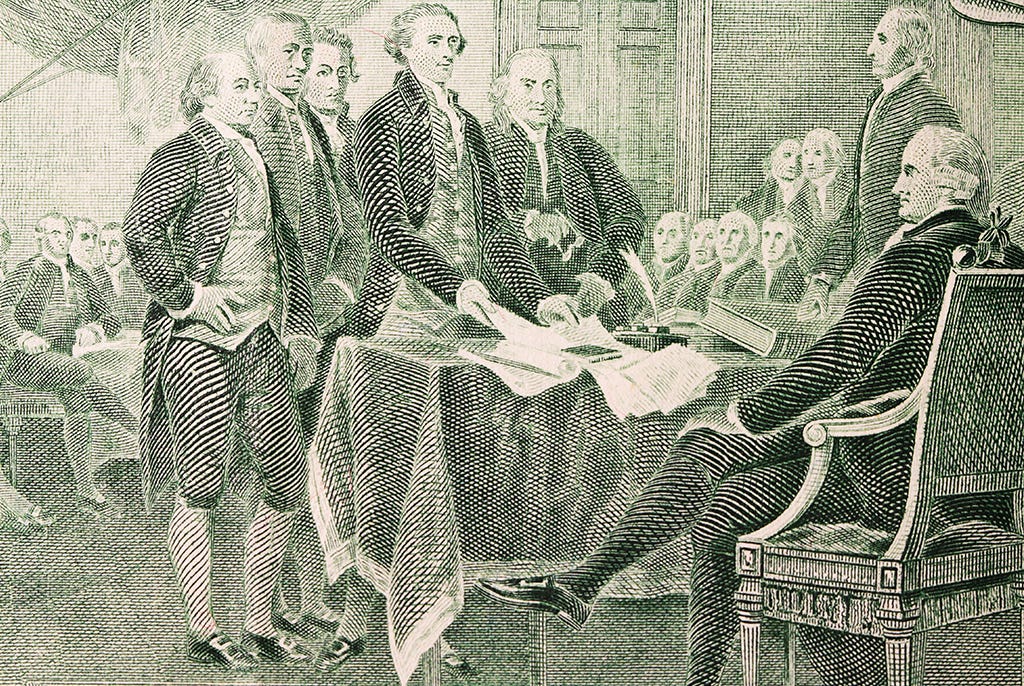Building A Mastermind Group: Beyond The ‘Circle of Competence’
Summary: The concept of a ‘circle of competence’ has become well-known, especially amongst investors. It is the idea that you have a defined set of skills and knowledge, and that when making important decisions in your professional life you should stick to your guns, i.e., what you know. I think this is a story sold to investors. Your knowledge is not bound by hard lines. Instead, your ‘competence’ gets blurry the further you stray. It’s like a flashlight that’s strongest in the center and weaker on the outside. There’s a method that helps you strengthen your set of skills, brightening the dim spots: building a mastermind group. Many successful people form groups to debate and share ideas, strengthening each other's work and understanding, while creating groundbreaking new insights.
Introduction
Warren Buffett once said:
“Defining your circle of competence is the most important aspect of investing. It’s not important how large the circle is. You don’t have to be an expert on everything. But knowing where the perimeter of that circle of what you know and what you don’t know is, and staying inside of it, is all important.”
This holds some degree of truth.
Making decisions about something you don’t know is reckless. It can lead to poor decisions and bad outcomes, especially in the long term.
However, it ignores the fact that you can gain insight about your intellectual weak spots by appealing to the right people.
Your circle of competence is not a walled garden, but rather more like a concentric landscape. Picture it: The farther you move away from the center, the dimmer the light, until you find yourself stumbling in the dark.
But what if you could progressively illuminate the shadowy periphery of your understanding, without having to amass that knowledge alone?
This is where the transformative power of building a mastermind group comes in. While Warren Buffet and others in the same vein emphasize the importance of self-limitation, of staying within your 'circle,' they often overlook one significant point: Your circle of competence can be expanded through the combined wisdom of a well-curated network.
In this article, I’ll explore how building a mastermind group not only fortifies your existing competencies but can also rapidly illuminate those dim areas on the landscape of your understanding. It's like having multiple flashlights, each contributing its beam to shed light where you alone might find only partial knowledge.
Circle of Competence
A "circle of competence" is a principle developed by Warren Buffett and Charlie Munger. It refers to the idea that each person has a particular area (or areas) where they are exceptionally competent, often due to their education, experience, or innate abilities. In other words, it's an area where an individual can understand, analyze, predict, and make decisions with a higher degree of accuracy than in areas outside their circle of competence.
For instance, an engineer might have a circle of competence in areas of technology and construction, while a doctor's circle might include pharmaceuticals and healthcare services.
Other less obvious knowledge can also be part of your circle of competence. If you moved around a lot as a kid, you might know about how it feels to be exposed to multiple cultures, or lack a stable home, or speak multiple languages. Or you might have insight into the different migration regulations of each of the countries you lived in.
In a 1996 shareholder letter, Warren Buffett summarizes:
“What an investor needs is the ability to correctly evaluate selected businesses. Note that word “selected”: You don’t have to be an expert on every company, or even many. You only have to be able to evaluate companies within your circle of competence . The size of that circle is not very important; knowing its boundaries, however, is vital.”
So, Buffett thinks understanding where your knowledge and skills begin and end is crucial, as this defines where you should focus your professional decisions.
People often overestimate what they think they know, which can lead to them attempting to enter fields and solve problems they’re simply not equipped to properly understand.
This is why self-awareness is key to understanding your circle of competence. Knowing what you don’t know (or where your knowledge is shaky) is as important, if not more important, than knowing what you do.
Individual Circle of Competence
For Buffett, any financial investments made by a person must lay within the boundaries of their own knowledge.
Charlie Munger took this concept a step further by using the Circle of Competence to identify where we should devote our limited time in life to achieve the most success. This is focused on identifying our own competitive advantage by playing in the areas based on our strengths and staying within those boundaries.
Thus, Munger states: “knowing what you don’t know is more useful than being brilliant.”
Others stand by this principle:
“I’m no genius. I’m smart in spots—but I stay around those spots.” — Tom Watson Sr., Founder of IBM
"Stay in your circle of competence. You want to be a duck in a pond where you're the only duck." - Jeff Bezos
"By focusing on what we do well and leaving the rest to others, we leverage our greatest assets." - Tim Ferriss
"Don't try to do everything yourself. Know what you do best and focus on that. Know what others do better and let them handle that." - Richard Branson
So, a lot of successful people have recognized the importance of sticking to what you know, beyond the investment realm as posited by Buffett.
However, this is a narrow conception of success — and not the one I favor myself.
I believe the most successful people haven’t stayed within their ‘circle of competence’, but instead surpassed it by building bridges with various experts from different fields. I’m quite certain that at the start of SpaceX, Elon Musk was no expert in rocket science. Yet, SpaceX went on to become one of the world’s biggest private companies. Elon has stressed time and time again how important his reliance on the people around him has been for his success.
I want to show you how thinking in terms of a circle of competence might limit your horizon of possibilities. Instead, you should think about your knowledge as a product of the collective intelligence of your network.
What you know isn’t just what you as an individual can draw from (i.e., your personal experience, skills, and knowledge). What you know is the sum-total of the skills and knowledge that your network of experts have, as long as you know how to leverage it. When you think about your circle of competence, then, you shouldn’t just think about yourself, but also the people you choose to surround yourself with.
Read on as I unpack this powerful idea further.
The Collective Circle of Competence
There’s two ways you can grow your circle of competence.
First, you can scale your personal skill set and come up with novel ways of configuring what you can uniquely provide. So basically, you can learn more, and combine your knowledge in new ways.
As Munger says: “If you’re going to live a long time, you have to keep learning. What you formerly knew is not enough. If you don’t adapt, you’re like a one-legged man in an ass-kicking contest.”
To be a life-long learner is one of the most powerful competitive advantages.
A tactic to grow your individual circle of competence is by learning things and skills from different people and from multiple fields. Gaining multidisciplinary knowledge equips you with a more comprehensive model of the world, enabling a big-picture perspective. Plus, it leads to innovation as you can combine knowledge from seemingly disparate fields to create novel ideas. If you want to leverage this tactic to grow your individual circle of competence, I encourage you to read my article on Compound Knowledge.
Secondly, you can draw from the expertise of the people you surround yourself with, growing your collective circle of competence. This will be the option I’ll focus on here.
Mastermind groups are the most effective way to grow your collective circle of competence. The key aim of these groups is to help its members solve their problems with input and advice from other members in the group. It’s basically peer-to-peer mentoring between people from many, usually varied, walks of life.
Members can offer each other a unique perspective based on their individual experiences and expertise, creating a network of experts united to share and discuss ideas.
Collective Circle of Competence / A Mastermind Group
It’s important to note that mastermind groups are slightly different from the idea of a ‘collective circle of competence’ — the first is an established pact you make with fellow intellectuals, the second is the state in which your knowledge is bolstered by the knowledge of your network. Mastermind groups are one of the most effective ways to grow your collective circle of competence (of course, there are other ways, like the 5-minute Expert Call).
You do, however, need to carefully select the people who will form your network of experts to consult when you need to solve a problem or make a decision.
The key idea is: your ‘competence’ isn’t restricted to the personal skills and knowledge you can draw from instantly on any occasion (your individual circle of competence). Rather, your competence is as strong as the collective competence of your network, as long as you know how to leverage it — and mastermind groups are amongst the best strategies to do so.
The resulting skills of each person in the group will be much stronger than the sum of its individual members. ‘The whole is greater than the sum of its parts’.
"The strength of the team is each individual member. The strength of each member is the team." - Phil Jackson
Famous Mastermind Groups
The concept of a Mastermind Group was originally popularized by Napoleon Hill (1883-1970) in "Think and Grow Rich".
Hill was part of a mastermind group himself, and he highlighted the importance of such groups in his writings, stating that when a group of like-minded, achievement-oriented individuals come together, it creates a collective intelligence that surpasses the sum of its parts.
Source: LOC’S Public Domain Archive | Napoleon Hill, creator of the concept of a ‘mastermind group’
Mastermind groups are peer-to-peer mentoring circles designed to help members navigate through challenges using the collective intelligence of others. They are used to help members solve problems with inputs and advice from the other group members.
If the idea of a 'circle of competence' is to define your limitations, a Mastermind Group serves to transcend them. It serves as your own board of advisors, offering real-time insight and advice in a diverse array of disciplines. By seeking the knowledge and expertise of others, you effectively magnify your own capabilities.
Through history, some of the most successful people have been part of mastermind groups.
The Vagabonds: This was a mastermind group formed by Henry Ford, Thomas Edison, Harvey Firestone, and John Burroughs. The group met regularly to discuss their businesses and ideas. They helped each other to solve problems, brainstorm new ideas, and stay motivated.
There’s a famous story about The Vagabonds.
A farmer was driving in the country and he noticed five men standing by a Lincoln touring car stuck in the mud. He stopped and helped them pull the car out of the mud. One of the men shook his hand telling the farmer, “I made the car you’re driving.” Another said: “And I’m the man who made those tires”. With that he pointed to two of the others, saying, “Meet the man who invented the electric light and the President of the United States.” When the fifth man asked the farmer, “I guess you don’t know me either?” the farmer replied, “No, but if you’re the same kind of liar as these other darn fools, I wouldn’t be surprised if you said you are Santa Claus.”
The farmer had just stumbled upon Henry Ford, the creator of the automobile, Harvey Firestone, founder of the Firestone Tire and Rubber Company, Warren G. Harding, US President, Thomas Edison, famed scientist and inventor, and Luther Burbank, respected agriculturist.
This mastermind group was on its way to a campsite.
Instead of weekly meetings, the Vagabonds had road trips every summer since 1915 in motor camping caravans. Edison, Firestone, and Ford, along with the naturalist Thomas Burroughs before his death in 1921, invited guests like Burbank and President Calvin Coolidge to contribute with their specific expertise and strengthen the group’s brainpower.
Henry Ford, Thomas Edison, Warren G. Harding and Harvey Firestone | Source: miriamlaundry.com
The Inklings: This mastermind group was formed by C.S. Lewis, the renowned author and scholar, in the 1930s. Meeting in the famous Oxford pub, The Eagle and Child, this group comprised a mix of intellectuals, writers, and scholars, including J.R.R. Tolkien, author of "The Lord of the Rings," and Charles Williams, an editor at Oxford University Press. The Inklings came together to discuss their works-in-progress, exchange ideas on theology and literature, and offer each other constructive criticism.
Source: Wikimedia commons
A story often told about the group was their ritual of convening at the pub, affectionately known as the "Bird and Baby." Each member would read aloud their latest writings. One evening, when Tolkien was reading an early draft of "The Lord of the Rings," C.S. Lewis famously interrupted to say, "Oh no, not another elf!" Though it’s a light-hearted anecdote, it exemplifies the close-knit and candid nature of the group, showcasing how their honest feedback helped to refine their works into masterpieces.
Tolkien once wrote of Lewis: “Only from him did I ever get the idea that my ‘stuff’ could be more than a private hobby.”
Source: HarperCollins Publishers from the Marion E. Wade Center, Wheaton College
Vistage: This mastermind group is specifically designed for CEOs, business owners, and key executives. Founded in 1957, it has grown to become the world’s largest CEO coaching and peer advisory organization, with over 23,000 members in 20 countries. Vistage aims to improve the effectiveness and enhance the lives of CEOs by helping them solve their most complex business challenges.
One of the transformative moments in Vistage’s history was its global expansion. What started as a single CEO group in Wisconsin has transformed into an international network of CEOs dedicated to helping each other make better decisions for their companies, employees, and themselves. This global reach means that members have access to a diverse array of insights, solving problems in innovative ways that would be hard to come by in a local-only group.
“How Ben Franklin Created America’s First Mastermind Group” | Source: Vistage
The Vistage website explains:
“A Vistage peer advisory group will consist of successful CEOs outside your own industry. You’ll be able to see how CEOs in an array of spaces work and how you may be able to use their methods in your own line of work. There will be no pressure to compete with other members of the group, as no one will be an industry rival — it’s truly an environment of collaboration.”
Tips for Building a Mastermind Group
So, how can you build a mastermind group?
Identify Your Needs: Just as in creating a mastermind group, before reaching out to potential members of your network of experts, identify your needs and areas of ignorance. Are you looking to learn more about finance, marketing, tech, or perhaps a more niche area? This will guide your search for experts.
Diverse Expertise: Seek out individuals with diverse expertise and from different industries. You don't necessarily need individuals who are the top in their field (although that's great if you can get them). What you want are individuals who have a deep understanding and insight into their respective areas.
Establish a Relationship: Building a mastermind group requires establishing relationships. These can be existing relationships that you wish to formalize or entirely new ones. Networking events, professional organizations, online communities, or even social media can be great places to meet and connect with potential experts. Based on my personal experience, the strongest bond can be created when a relationship transcends business and turns into a personal friendship.
Continuous Learning and Growth: Make sure you share your work ethic or passion for learning with other members. This way constant growth is ensured. Always keep an eye out for potential new members who can add value to your network of experts and help you expand your collective circle of competence.
"Never doubt that a small group of thoughtful, committed people can change the world. Indeed, it is the only thing that ever has." - Margaret Mead
The above are perhaps more obvious steps to form a mastermind group. Less obvious yet impactful ways to build and enrich your group include:
1. Implement Asynchronous Communication:
Traditional mastermind groups often emphasize real-time meetings, whether in-person or online. While these are valuable, adding an asynchronous communication layer (such as a WhatsApp group) could add depth to the conversation. Utilize platforms that allow members to share thoughts, questions, or interesting articles in a "bulletin-board" style. This enables group members in different time zones or with varied schedules to participate fully and enriches the real-time conversations.
2. Periodic Expert Guests:
While the main value of a mastermind group comes from peer-to-peer interaction, occasionally inviting a guest expert can provide new insights and stimulate enriching discussions, like the Vagabonds did. This strategy can provide a refreshing change and can be highly educational. The key is to invite experts who can offer a perspective or expertise that the group lacks.
3. Keep it tight-knit:
Although there are obvious benefits of forming a big mastermind group, like Vistage’s, I think it’s usually more convenient and effective to keep it relatively tight-knit — bound together by strong relationships and common interests. Too many people can often create a sense of anonymity, as it’s hard to know everyone personally. Inevitably, as the group becomes bigger, the amount of communication you will have with its members will decrease and, paradoxically, your collective circle of competence will grow slower. As a rule of thumb, Bezos’ 2-pizza role is a good metric for the size of effective groups.
Conclusion
The idea of a "circle of competence" has been around for a while, and it's relatively useful for investing. But the power of a group—your collective circle of competence—takes it to a whole new level. The Inklings, Vagabonds, and Vistage are prime examples of how joining forces with others can open up a world of opportunity, insight, and innovation, actually managing to grow your collective circle of competence.
Building your own mastermind group is an accessible way to supercharge your personal and professional life. Starting your own group isn't hard, but making it great takes some extra steps. Think outside the box. Use data-driven approaches, invite guest members and innovate in how you structure meetings. The goal remains the same: intellectual growth.
Remember, your mastermind group doesn't just expand your skills, it also broadens your mindset. By working with people from diverse backgrounds and expertise, you don't just become more competent; you become more versatile, adaptable, and ready for whatever challenges life throws your way.
So, don't just stick to what you know. Grow your circle by teaming up with others. A mastermind group can be the secret weapon for your success.


